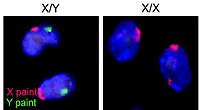
Photo from wikipedia
Cancer is a heterogeneous disease involving various genetic and epigenetic alterations that initiate and maintain the disease. Our laboratory is interested in understanding how such alterations contribute to tumorigenesis, alter… Click to show full abstract
Cancer is a heterogeneous disease involving various genetic and epigenetic alterations that initiate and maintain the disease. Our laboratory is interested in understanding how such alterations contribute to tumorigenesis, alter treatment response, and create vulnerabilities that may be targeted therapeutically. To interrogate cancer in vivo, we have developed a range of non-germline mouse models that enable a wide variety of cancer genotypes to be produced in a fraction of the time and cost of traditional germline methods. Approaches vary depending on the particular question, and can involve genetic manipulation and retransplantation of tissue stem cells and/or organoid cultures, the generation of multi-allelic ES cells and subsequent use in chimeric mice, and direct somatic engineering of mutations in particular tissues. Additionally, we have incorporated RNAi and CRISPR/Cas9 technologies to expedite our ability to study gene function in these models. Collectively, the combination of these tools has allowed us to identify and characterize new cancer drives using one-by-one or multiplexed approaches, and to perform rapid in vivo validation of “hits” from functional genomic screens. Examples of each method and approach will be presented. Citation Format: Scott W. Lowe. Interrogating cancer drivers and dependencies using non-germline mouse models [abstract]. In: Proceedings of the AACR Special Conference: Advances in Modeling Cancer in Mice: Technology, Biology, and Beyond; 2017 Sep 24-27; Orlando, Florida. Philadelphia (PA): AACR; Cancer Res 2018;78(10 Suppl):Abstract nr IA21.
Journal Title: Cancer Research
Year Published: 2018
Link to full text (if available)
Share on Social Media: Sign Up to like & get
recommendations!